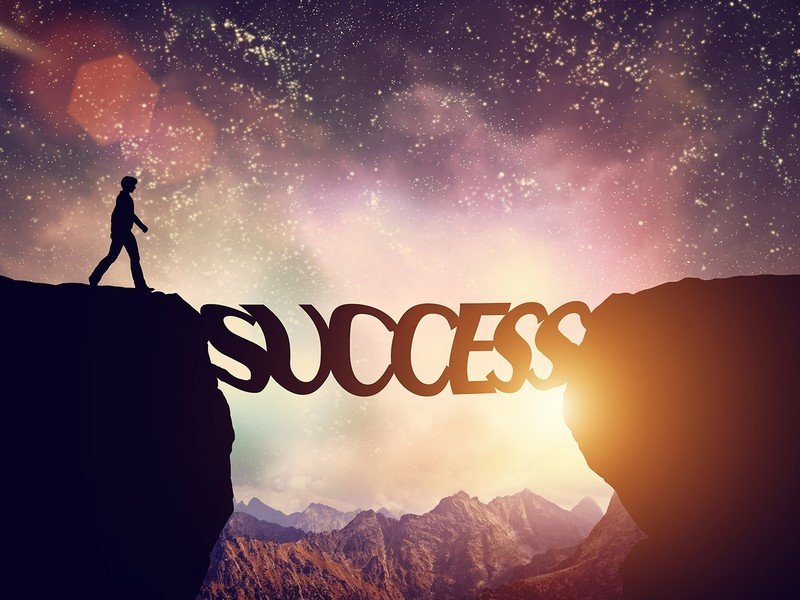Human desire for success: a double-edged sword

It is no surprise that human beings are emotional creatures. From hiding and living in small caves in the midst of constant fear to boasting our triumph over anything physically within our reach, we’ve come a long way. This triumph has only been possible due to the human desire to be better.
Since time immemorial, as civilizations arose, humans yearned for loftier roles, to possess what's grander than they hold, and to claim what's new—a story yet untold. This is what makes us different from the rest of other beings—a constant strive to be better tomorrow than who we are today. I can assure you that when other beings look up in the sky at night, they see nothing more than mere blobs of dim light and the murky abyss surrounding them, but human beings see it as a place to conquer, a place to set foot on, and a place to unravel the mysteries that lay beyond. This is the extent of the human desire for success. But it always begs the question: Is one really sure that this desire propels one to the path of success, or plunges them down the sheers of complete madness?
Desire can be a driving force for success. It instils a strong sense of achieving something and motivates one to follow their dreams. The human desire to always be on the path of improvement has its own inherent advantages. The number of beneficiaries due to the very same desire is in the millions if not tens of millions. Notable examples are Thomas Edison, Elon Musk, and J.K. Rowling.
We all recognize Thomas Edison for his invention of the light bulb, the phonograph, and the direct current source. His revolutionary inventions have changed the world for good. As it is said, Rome wasn’t built in a day. Likewise, Thomas Edison didn’t invent all these with swift successes left and right. People argue that he finally garnered success in inventing a functioning lightbulb nearly after one thousand failures. Had he not had this sense of desire, society today would’ve been very different. The desire to not give up until he finally had a positive result became his inner driving force for success.
Similarly, J.K. Rowling didn’t become J.K. Rowling by birth. This statement sounds silly, but what I mean by this is that without her desire and perseverance to not give up, she would’ve been just another Emma, Alice, or Janice living in Yate, and the world wouldn’t care to give a damn about her. The examples are many, possibly so many that I can never finish listing them out. However, the message remains the same: a positive attitude and a winning desire never fail.
However, it’s not all butterflies and fairytales. Desire can be the source of unhappiness and downfall for one. The desire for something or being overzealous in general can certainly lead someone to madness. It is not a new thing to see and hear somebody digging their own grave and lying on it. It’s a metaphor; please don’t take it literally. What I mean by this is that many people are so destined to reach their goals that they willingly sacrifice everything just for the sake of a little self-proclaimed victory. Family time, friends, refreshments, short giggles, and interactions that make somebody a human are some of the first things at stake when they have an intense desire for something. Prolonged avoidance of such basic yet vital interactions puts one in a state of dissipation and a feeling of being lost. As a result, it won’t be long before they lose their mind and eventually go out of control.
For example, Michael Jackson, often termed as the king of pop, achieved unparalleled success in the music industry. However, his relentless pursuit of perfection, fame, and success took a toll on his mental and physical health. He faced numerous legal and personal challenges, which some attribute to his unquenchable desire for success. Likewise, the American business magnate and aviator Howard Hughes had an insatiable desire for success. His success was believed to be unmatched. However, his relentless pursuit of wealth and perfectionism led to severe obsessive-compulsive disorder (OCD) and a life of extreme isolation. His mental and physical health deteriorated, ultimately leading to his downfall.
In this era of digital media and communication, we can connect with other people easily, allowing us to hear and feel other people’s stories easily. Upon opening LinkedIn, Quora, or any other social media app, we are blasted by the certificates, awards, and honours right in our faces. On one hand, hearing about the accomplishments of successful people can be incredibly motivating and can fuel one’s desire for success. These stories can serve as valuable sources of inspiration, pushing individuals to work harder and reach their goals. On the other hand, constantly comparing oneself to others who have achieved remarkable success can lead to feelings of inadequacy and self-doubt. People like me and you may question our qualifications, strategies, and whether we are "measuring up" to the standards set by our peers. This can create a sense of unworthiness and even discourage some from pursuing their entrepreneurial dreams.
This proves how the desire for success is closely intertwined with the emotional impact of witnessing others’ achievements. It’s a delicate balance between drawing inspiration from success stories and managing the negative feelings that can arise from perceived inadequacy. The path to achieving the desired success is a tightrope laid over a huge cliff. As a result, many people simply cannot keep up and fall down the cliff they want to conquer. However, as we navigate this delicate balance, let us remember that the desire for success is a powerful force, capable of lighting our path or casting shadows of doubt. It’s in recognising this duality that we can harness our inner drive, pursuing success while cherishing the essence of what makes us human



Leave Comment